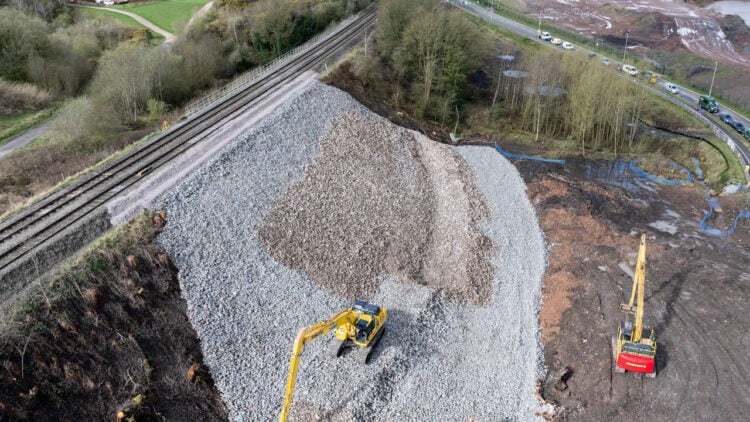Network Rail engineers have started to repair a landslip that occurred at its Old Dalby test track in Leicestershire last December and forced the line to be closed.
Although the landslip happened last December, adverse weather conditions since then and limited access to the site have, until recently, prevented engineers from starting work to repair the landslip.
As well as repairing the landslip, engineers will also use technology that will futureproof the site and be more friendly to neighbours and the environment.

During the reinstatement, 17,000 tonnes of soil and other vegetation will be removed from the landslip site before 19,500 tonnes of material are used to reconstruct the full embankment.
Repairing the landslip will also require the removal and replacement of 265 metres of track, as well as the installation of new overhead line equipment.
We want to thank local residents for their patience while the work is on-going.
Julia Territt, director, Supply Chain Operations at Network Rail
To help prevent future landslips at the site, a new 370-metre drainage system will be installed.

To minimise disruption to residents, work will mainly take place during the day, and to reduce noise electric power will be provided from a remotely controlled solar-powered generator.
The test track runs for 13 miles between Melton Mowbray in Leicestershire and Edwalton in Nottinghamshire on the route of the original Midland Railway line between Kettering and Nottingham that opened in 1897.
Network Rail opened the line as a test track in 1966 as part of the wider Rail Innovation and Development Centre at Melton Mowbray and is currently used to test new trains and technology before they are released for use on the operational railway.

This winter’s almost-continual rain has caused landslips next to railway lines in many parts of the country, most recently a major one near Telford in Shropshire.
Our engineers have started working on site to remove 17,000 tonnes of material to progress with rebuilding the embankment at Old Dalby.
We have a clear programme of work to repair the site of the landslip with an estimated completion date of summer 2024.
We want to thank local residents for their patience while the work is on-going.
Julia Territt, director, Supply Chain Operations at Network Rail






Responses